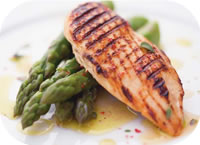Cleansing Confusion
Considering the proposed benefits of detoxification

Adding fruits, vegetables and nuts is good for your digestive health, but make sure you maintain a healthy intake of protein and overall calories.
By Nancy Burke, R.D.; Danielle Karsies, M.S., R.D.; and Melissa Shannon-Hagen, R.D., CSO, of the U-M Rogel Cancer Center Symptom Management and Supportive Care Program
Fight cancer, lose weight, get glowing skin, boost your health and well-being. These are just some of the proposed benefits of detoxification.
Advocates for detox claim our bodies are continually bombarded with toxins from our food and the environment, such as pesticides, food additives, pollution and cigarette smoke. They claim these toxins build up in our bodies and cause a variety of health problems. They also claim that special treatments -- including herbals, supplements or special diets -- help to remove these toxins from our body.
In fact, there is no reliable evidence that our bodies are fatigued through normal digestion or that the body retains toxins that are dangerous to our health. Our kidneys and liver act as efficient filters, processors and eliminators of toxins.
Follow these tips for a healthy lifestyle:
- Don't smoke.
- Drink alcohol in moderation: at most, one drink for women per day, two for men.
- Be physically active at least 30 minutes, five days a week.
- Eat a healthy diet with an emphasis on fruits and vegetables, whole grains and legumes.
- Limit your intake of processed and red meats.
- Try to eat foods that have been minimally processed or that are closest to the form in which they were grown.
Most detox diets promote more fruit, vegetables, beans, nuts, seeds and lots of water, all of which are healthy, fiber-rich diet changes. The problem lies in the foods that are banned -- typically wheat, dairy, meat, fish, eggs, salt and sugar. For people actively receiving cancer treatment, detox diets fall short on many nutrients and could lead to deficiencies, lowered immunity or unwanted weight loss.
Patients with cancer should avoid detoxification programs that restrict consumption of adequate amounts of food or restrict certain food groups, as this could worsen illness or potentially decrease a treatment's effectiveness. For example, an abrupt switch to a high-fiber diet can cause constipation, especially if you don't also get enough fluids.
Other detox methods such as herbal tonics, juicing and colonic cleansing can have more harmful effects. Herbs such as licorice, if used in excess, may produce high blood pressure, low potassium levels and cardiac arrest. Excessive juicing or laxative use can cause diarrhea, which can lead to fluid and electrolyte losses. Colonic enemas, such as coffee enemas, have been linked with at least three deaths due to severe electrolyte losses and infection. The key is not to focus on fad diets or quick fixes, but to make healthy diet and lifestyle choices.
